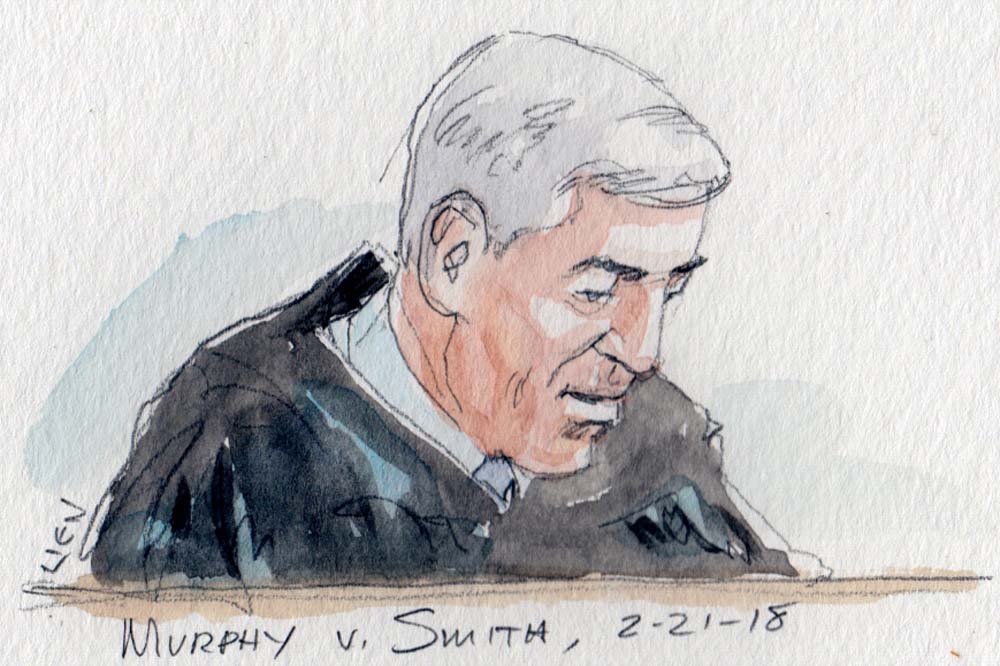Opinion analysis: Divided court holds more of prisoners’ damages awards must go to attorney’s fees

on Feb 22, 2018 at 4:02 pm

In a 5-4 decision, the Supreme Court in Murphy v. Smith held that prisoners who are awarded attorney’s fees in connection with their successful civil rights cases must also pay those fees, up to a maximum of one quarter of their damages awards. The decision is a loss for prisoners – particularly those with egregious cases – some of whom will now see more of their damages awards go to their attorneys than they otherwise would have. It is also a loss for district-court discretion; the approach rejected by the majority would have allowed district courts to decide how much of a prisoner’s damages award should go toward fees, ranging from a very small amount up to a maximum of 25 percent of the award.

Justice Gorsuch with opinion in Murphy v. Smith (Art Lien)
This case turns on a provision of the Prison Litigation Reform Act that applies when a prisoner wins both a money judgment and attorney’s fees under 42 U.S.C. § 1988. That provision states that “a portion of the judgment (not to exceed 25 percent) shall be applied to satisfy the amount of attorney’s fees awarded against the defendant.” Thus, this case centers on whether the parenthetical “(not to exceed 25 percent)” was intended to set a ceiling on the portion of a prisoner’s damages award that a district court could channel toward fees, or was instead intended to trigger defendants’ obligation to pay a plaintiff’s attorney’s fees only when those fees exceed 25 percent of the damages award.
Writing for the majority, Justice Neil Gorsuch first focused on the meaning of the “infinitival phrase” “to satisfy the amount of attorney’s fees awarded,” writing that when one attempts to satisfy an obligation, one “usually means … to discharge the obligation in full.” In response to the plaintiff’s observation that speakers sometimes use “satisfy” in contexts involving less than full satisfaction, such as when a college student applies three credits earned in a math class to satisfy (in part) the requirements of a chemistry degree, Gorsuch wrote that that analogy actually works against the plaintiff, because the registrar lacks discretion to award fewer than three credits for a three-credit class.
Next, Gorsuch turned to the word “portion,” which the plaintiff (and the dissent) argued connotes district court discretion – that is, just as a portion of pie can be either large or small, a district court may direct either a large or a small amount of a plaintiff’s damages to attorney’s fees. Although Gorsuch agreed that it is at least possible for “portion” to signal a variable amount, he observed that the defendants’ interpretation would also lead to variable amounts of prisoners’ damages awards going to fees, because those fees could total less than 25 percent of damages awards in some cases. Thus, he concluded that either side’s interpretation of the statute is consistent with the plaintiff’s view that “portion” indicates a variable amount.
Finally, Gorsuch rejected the relevance of the fact that the main fee-shifting statute in federal civil rights cases, 42 U.S.C. § 1988, contains discretionary language. Here, he concluded that the PLRA’s structure and purpose indicate that Congress did not intend to leave district courts with residual discretion in prisoners’ civil rights cases. Similarly, in a lengthy footnote at the end of the opinion, he also dismissed the plaintiff’s argument based on an earlier draft of the PLRA’s fees provision, which clearly directed courts to implement the defendants’ approach to fee shifting. The plaintiffs had argued that the Supreme Court should infer from the change to the draft language that Congress intended a less rigid approach to fees, but the majority concluded that “[t]here is no way to know [why Congress made the change], and we will not try to guess.”
Justice Sonia Sotomayor wrote a dissenting opinion on behalf of the four more liberal justices. She also began with the statutory language, stating that “a contribution that is ‘applied to satisfy’ an obligation need not be intended to discharge the obligation in full.” Moreover, she observed that there would be very few cases in which 25 percent of a prisoner’s damages award would be enough to cover an award of attorney’s fees in full. Thus, when a portion of a damages award is “applied to satisfy” a fee award under the PLRA, it will generally not fully satisfy that award as a practical matter.
In addition, the dissenters observed that the terms “portion” and “not to exceed” are often “discretion conferring,” and that Congress could have been far more clear if it intended the PLRA to have the meaning that the defendants advanced – including by retaining the language contained in the earlier draft of the statute. Thus, the dissent concluded that although the PLRA was intended to cabin district courts’ discretion in awarding attorney’s fees in prisoners’ cases, it did not eliminate that discretion completely.
Beyond their respective conclusions, the two opinions offer a case study in how the more conservative and more liberal justices may approach the task of statutory interpretation. For example, the dissenters (unlike the majority) detailed the facts of the case, which suggest a reason that the district court may have directed that only 10 percent of Murphy’s award go toward fees: A fairly minor dispute about a dirty seat in a prison cafeteria resulted in the defendants, two prison guards, crushing Murphy’s eye socket, causing permanent damage. And while the majority opinion pinpointed certain key words and phrases in the statute to conclude that the defendants’ view of the PLRA was the “clear winner,” the dissent took a more contextual approach, finding ambiguity in the statutory language and looking to surrounding language in the PLRA, legislative history and the realities of prisoner litigation.


